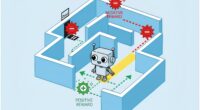Cognitive science researchers have identified critical disparities between human and artificial intelligence learning capabilities that could impact future enterprise AI deployment and human-machine collaboration strategies.
An international research team led by Bielefeld University has published findings in Nature Machine Intelligence demonstrating that machines and humans employ fundamentally different approaches to generalisation, the ability to adapt knowledge to unknown situations.
Professor Barbara Hammer, head of Bielefeld University’s Machine Learning Group, emphasises the significance of AI integration across business sectors, including medicine, transportation and decision-making systems.
“If we want to integrate AI systems into everyday life, whether in medicine, transportation, or decision-making, we must understand how these systems handle the unknown,” Hammer stated. “Our study shows that machines generalise differently than humans, and this is crucial for the success of future human–AI collaboration.”
The research addresses the challenge that “generalisation” represents entirely different processes for humans versus AI systems, potentially creating misaligned expectations in collaborative environments.
Professor Benjamin Paaßen, junior professor for Knowledge Representation and Machine Learning at Bielefeld, explains that while humans employ conceptual thinking and abstraction, AI systems utilise various mechanisms from machine learning, extending beyond known data domains, to rule-based inference in symbolic systems.
The study establishes a shared framework across three dimensions: defining generalisation, understanding achievement methods, and developing evaluation criteria for both human and artificial intelligence systems.
The collaborative project involved over 20 experts from internationally leading institutions, including the universities of Bielefeld, Bamberg, Amsterdam and Oxford, originating from a workshop at the Leibniz Centre for Informatics at Schloss Dagstuhl.
The research highlights implications for designing AI systems that better reflect and support human decision-making processes within organisational contexts.
The findings suggest enterprises must consider these fundamental learning differences when implementing AI technologies alongside human teams to optimise collaborative effectiveness and decision-making outcomes.











